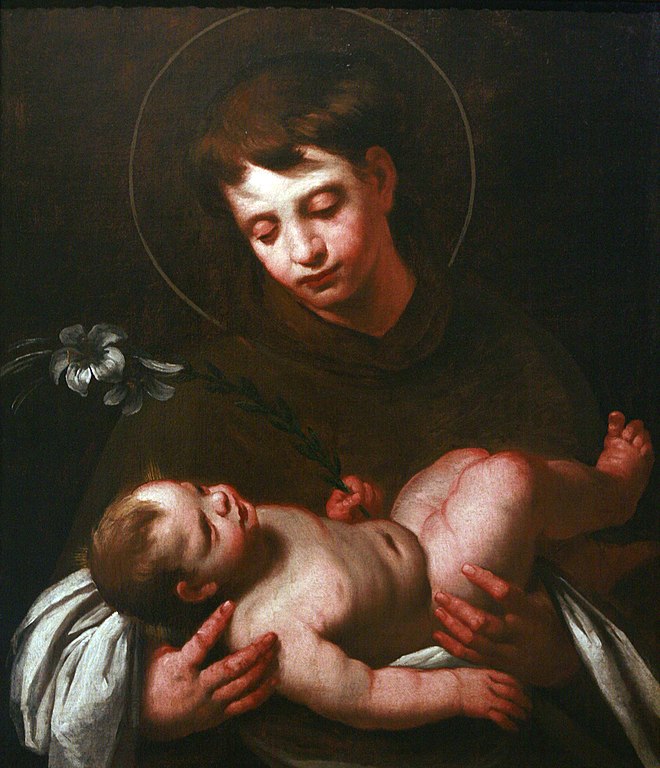Saint Anthony of Padua (1195 – 1231 A.D.) is one of the most beloved of saints. Widely renowned as the heavenly locator of lost articles – and even lost hope, lost faith, and lost souls – the circumstances of his holy life confirm the appropriateness of that designation.
Saint Anthony was born to a noble family of Lisbon, Portugal, and christened Fernando. At a very early age, highly unusual in one so young, he displayed an extraordinary love for God, seeking Him daily through prayer and devotion.
In his search for knowledge of God and of His will for his life, at the age of only 15, Fernando entered the Augustinian Order in Lisbon as a canon. He applied himself so diligently to the study of Sacred Scripture that he committed much of it to memory. Before long, his deep desire for solitude and contemplation prompted earnest requests for transfer farther from home; he relocated to Coimbra, about 125 miles away.
After learning of five Franciscan friars martyred for preaching the Gospel to Moslems in Morocco, Fernando experienced a burning desire to emulate them and to suffer the same fate, if God so willed. Having become acquainted with Franciscans in a nearby friary, he also felt himself drawn to their life of poverty and penance.
So Fernando voiced another unwelcome request – to change Orders and become a follower of Francis of Assisi. Reluctant consent obtained, he donned the Franciscan habit, taking the name Anthony. His urgent request to be sent to Morocco was approved; however, his seeking the crown of martyrdom was not to bear fruit.
In Morocco, grave illness forced him to board a ship headed for return to Portugal. Once again, God’s plan for him changed. Blown far off course, the ship eventually landed off the coast of Sicily, where Anthony came into the care of Franciscan friars.
Only partially recovered, Anthony traveled to the renowned Chapter of Mats, where 3,000 friars gathered at Assisi on Pentecost, 1221. From there, he was assigned to a humble friary at Montepaolo, cheerfully performing menial tasks and living a simple life of poverty, joy, and contemplative prayer.
The volume entitled Life of St. Anthony ~ Assidua was written by an unnamed Franciscan friar, the saint’s contemporary in Padua, and published in 1232 A.D., the year of Anthony’s speedy canonization.
Concerning Anthony’s time at Montepaolo, the author writes: “In truth, although Anthony was so industrious that he relied on his memory rather than on books, and although he abundantly overflowed with the grace of mystical language, the friars nonetheless knew him as more skillful in washing kitchen utensils than in expounding the mysteries of Scripture” (27).
All of this changed unexpectedly when Anthony was asked to speak, without preparation, at an ordination gathering of Franciscans and Dominicans at Forli in 1222. That one extemporaneous address thrust the unknown friar into the limelight, stunning listeners with his knowledge of Scripture and the force of his preaching.
“The unexpected depth of his words increased their astonishment; but, to no lesser degree, the spirit with which he spoke and his fervent charity edified them. Filled with holy consolation, they all respected the virtue of humility, accompanied by the gift of knowledge, that was manifest in the servant of God.”
Word reached Francis himself; in a rare personal letter, he gave Anthony approval to teach theology to friars at Bologna, provided the pursuit of study didn’t distract them from prayer. As cautious as he was about academics in general, Francis acknowledged his friars’ need for training in theology to refute the heresies proliferating in Europe.
One example, the Albigensian heresy, had taken hold in the south of France. Traveling tirelessly there, Anthony preached sound doctrine to those in danger of being lost, combining Augustinian Scriptural training with Franciscan spirituality. He did not engage in confrontations but exemplified the truth by the holiness of his life.
In addition to constant teaching and preaching, Anthony served his Order as Minister Provincial in northern Italy and as an envoy to Pope Gregory IX. Throughout his various ministries, he never missed an opportunity for outreach to the physically or spiritually poor and needy, seeing in them the face of God that he sought.
Throughout Lent in 1231, Anthony preached an exhausting series of daily sermons in Padua, outdoors, to crowds of as many as 30,000. Miracles resulted in countless hearts: quarrels resolved, lives of crime renounced, reconciliation achieved. Anthony emerged so depleted that a crude cell was constructed for him in a huge tree some distance away, a forest haven for rest and contemplation.
Very soon, Anthony became aware that his time of seeking God on earth was nearing its end. His severely weakened condition would not allow for his requested return to Padua, and he was carried to a friary at Arcella, about a mile outside the city. On June 13, 1231, he received the final sacraments, praying and singing along with the friars.
“ .. He suddenly raised his eyes to heaven and, with a stunned look, stared in front of himself for a long time. When the friar who was supporting him asked what he saw, he answered, ‘I see my Lord’“ (41).
The patron saint of the lost finally had found the One he had been seeking all his life.
~~~~~~~~~~~~~~~~~~~~~~~~~~~~~~~~~~~~~~~~~~~~~~~~~~~
The Litany of the Lost is a prayer which encompasses many possible losses we can experience far beyond the misplaced item we consider indispensable. Saint Anthony will listen and assist if we turn to him in faith, no matter the situation.
© All Rights Reserved, Living His Life Abundantly®/Women of Grace® http://www.womenofgrace.com










